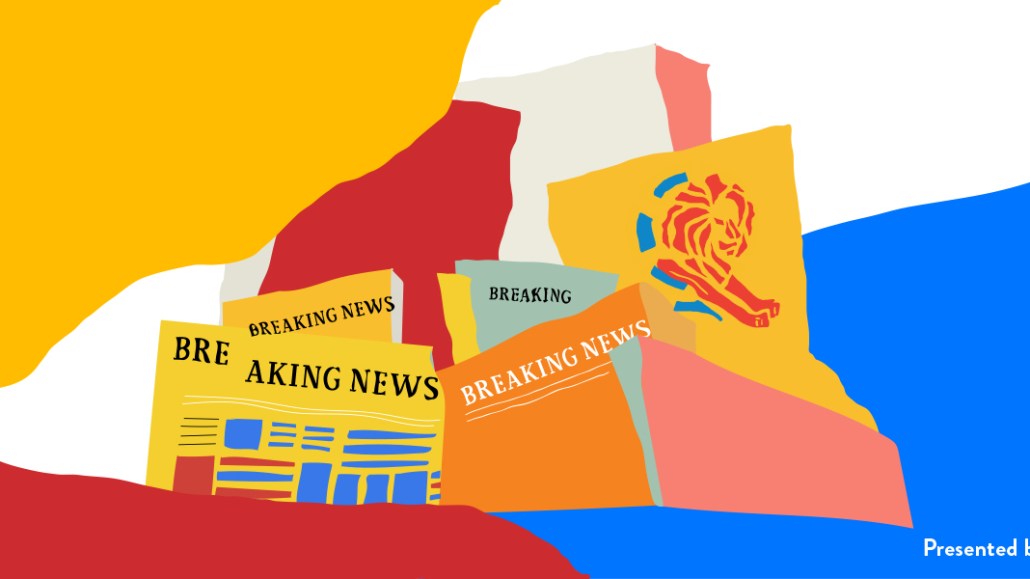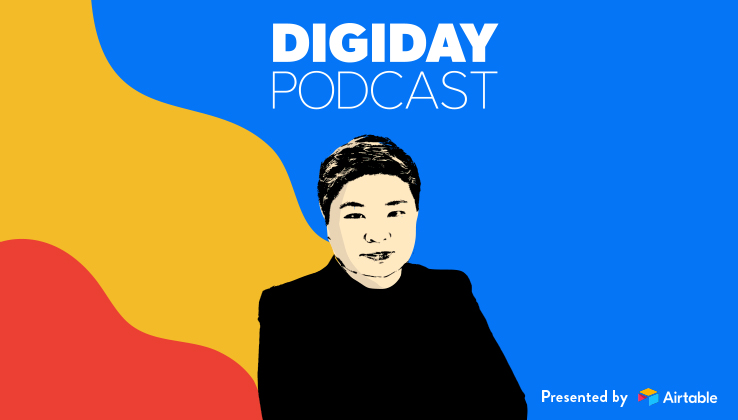Secure your place at the Digiday Media Buying Summit in Nashville, March 2-4
Cannes Briefing: ‘Just the right amount of noise’: Facebook and Google are quieter at Cannes

Digiday covers the latest from marketing and media at the annual Cannes Lions International Festival of Creativity. More from the series →
There’s no doubt this year’s Cannes Lions festival is a more subdued affair than it’s been in years past, but it isn’t just ad agencies and ad tech vendors pulling back — it’s Facebook and Google, too.
Google and Facebook have significant presences at the festival this year, with spots on the beach in addition to the requisite speaking slots for their executives on the main stage of the Palais. But their efforts feel somewhat muted compared with some of the past five or six years, when “tech giants invade Cannes” was the festival’s most prominent headline.
Both companies have shunned large-scale parties with expensive musical acts in favor of smaller, more targeted events and dinners, while attendees say their execs aren’t as prominent along the Croisette and in its hotels.
And neither seems to be courting press attention the way they previously have. In prior years, Facebook has tied new ad product and feature announcements to the festival, for example, while this year it seems less eager to make a splash.
Google said its presence with its Google Beach and two Palais sessions is “consistent with previous years.”
Facebook did not return requests for comment.
For agencies and vendors, the belt-tightening at Cannes is directly tied to their shaky business models. Agencies are under fire more than ever, as clients attempt to take more marketing functions in-house and as publishers and consultancies increasingly attempt to swoop in to steal their business. And ad tech has seen its opportunity shrink as publishers and ad buyers try to cut out middlemen, and as GDPR limits their data collection capabilities.
But for Facebook and Google, the pullback has more to do with optics than any business model concerns, attendees say.
It’s been something a rough year for both companies on the public relations front. Facebook has come under fire repeatedly for its data and ad practices, most prominently around the Cambridge Analytica scandal. With that in mind, it perhaps doesn’t seem as appropriate to brag about how advertisers use its granular targeting data in all manner of creative ways.
And Google has had its own issues on the brand-safety front, as advertisers continue to complain about their brands showing up next to unsavory content on YouTube and across its display ad network.
“Given the current situation, I think they’re conscious of making just the right amount of noise,” said one ad buyer who met with both companies this week.
Other attendees suggested there isn’t as much upside for those pitching to buyers at the festival this year, given that Publicis Groupe has reduced its attendance significantly. The platforms might have simply adjusted their effort and spending to compensate, they suggest.
But another theory is Facebook and Google simply don’t need to make as much of an impression these days. As the pair continues to suck up the vast majority of digital ad spending, it’s clear marketers don’t need convincing about the value of their ad products. Why risk rocking the boat or drawing too much attention to that fact with lavish parties?
Whatever the reasons, the pullback from Facebook and Google has also had its benefactors. Spotify has taken the crown from Google for the must-attend beach party, for example, with musical performances from The Killers on Tuesday and Travis Scott on Wednesday. And Pinterest has various attractions along the Croisette, in addition to embedding itself in agencies’ spaces.
And then there are the consultancies, of course, which have descended on Cannes in greater numbers this year than ever before and already formed one of the week’s major talking points.
It’ll be interesting to see how the next year shakes out across the industry and the impact that will have on the tone of next year’s festival overall. With Publicis back on board, and despite the industry’s woes, it wouldn’t be surprising if next year’s event returns to the chaos of previous years. But by the same token, it wouldn’t be surprising if more of the festival moves upstairs into hotel suites and to private meetings as the parties continue to fade. — Jack Marshall
Overheard on the Croisette (and beyond)
“We’re viewing publishers more as partners here than either Google or Facebook. It’s publishers that we’re focused on meeting with this week, less so the platforms.” — Publishing executive
“Facebook is yesterday’s news. We spend too much time on the duopoly. The obsession with the duopoly is misplaced. Amazon and Google with the connected home, what is media going to be?” — Publishing executive
“It feels like the ‘I’m sorry’ year — a real ‘mea culpa’ time.” — Agency executive
“I don’t really know what’s going to happen with Snap. Its share price has gone down, but its costs continue to go up. It’s going to have to do something differently if it wants to have a sustainable business.” — Publishing executive
The Digiday Podcast Cannes Edition hosts Jen Wong

Reddit has 330 million monthly users on its platform, but still struggles to woo advertisers. That’s why Jen Wong, its newly minted chief operating officer, is at the Cannes Lions festival. “Ads will be a big business for us because all things they want, we have — authentic word of mouth, mind hive for people deep in their categories,” Wong said on the Cannes edition of the Digiday Podcast. “To ignore it from an advertising and insights perspective doesn’t make sense.”
Read more excerpts and listen to the episode here.
Influencer backlash
It feels like a year of reckoning in Cannes, and one casualty may be the influencer marketing landscape. Long unchecked, influencer marketing is in the crosshairs of top CMOs from Unilever’s Keith Weed to eBay’s Godert van Dedem, who are publicly questioning the value of influencers and concerned about the amount of fraud in the space. “Each category of marketing is going through a reckoning. Three years ago, influencer marketing was growing in scale. Now, people are looking at it critically. It’s a natural shaking out,” said HP global head of media Dan Salzman. Read more.
Coming up
10 a.m.-noon: Brian Morrissey, Digiday’s president and editor-in-chief, will host a breakfast panel with Domo at La Palme d’Or, located on the rooftop of Hotel Martinez. They’ll discuss everything from brand safety to ad blocking, focusing on the complexity and volume of factors (and data streams) at play.
Noon: Angela Ahrendts from Apple takes the Cannes stage with Tor Myhren, vp of marketing communications and former agency exec.
5 p.m.: Carolyn Everson from Facebook joins UM’s Daryl Lee and Unilever’s Weed for a chat about the power of platforms.
Tonight
6 p.m.: The “boss lady soiree” at the Girls’ Lounge in the Martinez.
6:30 p.m.-1 a.m.: News UK party at Château de Garibondy in Le Cannet. Superstar DJs including Idris Elba, Fatboy Slim, Matt Darcy and Kate Lawler and Kylie Minogue.
10 p.m.-2 a.m.: Spotify Beach Party. Performances by Chvrches and Travis Scott.
6 p.m.-9 p.m.: Live Nation at Alang Alang.
More in Marketing

Future of Marketing Briefing: AI’s branding problem is why marketers keep it off the label
The reputational downside is clearer than the branding upside, which makes discretion the safer strategy.

While holdcos build ‘death stars of content,’ indie creative agencies take alternative routes
Indie agencies and the holding company sector were once bound together. The Super Bowl and WPP’s latest remodeling plans show they’re heading in different directions.

How Boll & Branch leverages AI for operational and creative tasks
Boll & Branch first and foremost uses AI to manage workflows across teams.





